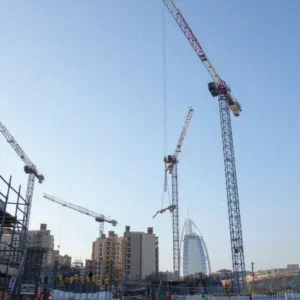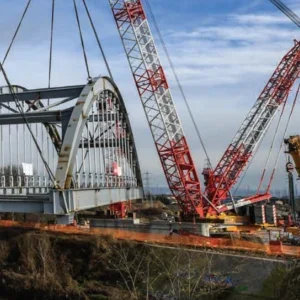When Lowe came back to tower cranes in 2003, after 15 years running Hewden’s mobile crane business, he inherited a company that was in ‘freefall’. He came back to an industry in which he had already worked 10 years, ending up as sales director at Stanley Davies, which eventually became Hewden.
Although Hewden had sold the business to concrete contractor PC Harrington in 2002, the business was still reeling from the Canary Wharf, London, accident three years earlier that killed three men. Lowe attended the funeral of the two erectors who died, and called it one of the ‘most uncomfortable’ days of his life. He blames the accident on a series of small management failures: an “accumulation of various things”.
HTC still marks the anniversary of the Canary Wharf accident. “Everyone goes outside and has a minute’s silence, and then they get a lecture,” Lowe says. “‘I don’t pay you to do it wrong, I don’t pay you to cut corners.’ And I don’t. I pay you to do it right.’”
The early days
In his early days at HTC, business was not bad, Lowe says, but the company was scrambling every week to prepare cranes for that weekend’s work. “Friday was our busiest day,” Lowe remembers. Cranes were only fixed when they broke down, in a last-minute panic, with few trained members of staff. Many repairs had to be fixed by Wolff engineers.
Perhaps worst of all, the company was losing money on many of its jobs to keep up with fierce competition. It also lost money on jobs it had won when wind speeds forced erectors off a site–
because nobody checked the weather.
Lowe said it took him three months to understand all of the problems at HTC. “There were holes in every part of the company.” Early on, realising that unexpected breakdowns were destroying the company, he started to rder spare parts to carry out repairs. “We started spending £100,000 a month on spare parts. The fleet was starved.” Gradually, he says, technicians began to pull ahead of crane orders.
In the meantime, he cemented his control of other aspects of the operation.
“This industry is dangerous. To do it, and do it right, means training people properly,” Lowe says. “It’s not all about the metal, it’s about the people. This is where people get it wrong. So many of my smaller competitors don’t own an erection crew, don’t carry electricians, don’t service a crane before it goes out, don’t have an independent inspector. That all costs money.” He reduced the company’s reliance on subcontractors to consolidate control of employees. And although loyal to and supportive of employees, he maintains a strict rule that anyone who leaves HTC will not be coming back. “I lost a few, he says, and it hurt—it always hurts—but the company is better for it.”
Lowe decided to pull out of competing in the mid-market, where the company was losing contracts on price. “Wolffs are not built cheap,” Lowe says. “We have the highest rates. That’s fine; someone has to do it.” HTC is one of only two companies in the UK who climb cranes with a hydraulic jacking frame. The other is its prime rival, Select Tower Cranes, owned by contractor Laing O’Rourke.
As Lowe began his work on the company, he started to form an impression of its competitors, and compared it to his time in the mobile crane business.
“Over 15 years, the UK mobile crane business changed a lot. Contract lifting came in, and the business became a lot more sensible, safer and more professional, and I worked on some of the committes to make that happen. The business matured. When I came back to tower cranes, I assumed that it had moved along as well—but it hadn’t. Nothing had changed since I had left it. Companies were still fighting over prices, tower crane operators were still being paid a fraction of mobile crane operators.”
Although he says that wages have improved, other aspects of the tower crane business have not. During the 1990s mobile crane operators were required to hold a heavy goods vehicle licence, which requires a three-yearly medical exam. The UK industry still does not require this of tower crane drivers. But HTC, in cooperation with its insurer Mitsui Hitachi, has implemented a similar programme for its staff.
Solving the UK’s problems
Similar tight managment, as Lowe exercises at HTC, is needed in the UK tower crane market as a whole, he says.
Tower cranes are no less dangerous than lorries, he says. During his mobile crane days, Lowe visited the headquarters of UK freight haulier Eddie Stobart, and was given a personal tour by Mr Stobart himself. He said he was amazed by the professionalism and organisation of the operation.
In the UK, freight transporters are required to get an operator licence. Applicants need to show details of a yard to park the vehicles, submit the names and qualifications of maintenance and inspection staff, and show evidence that a manager is competent.
He argues that licencing is the best way to improve tower crane safety. “At the moment, any jack-the-lad can buy some European crap and start a tower crane company. It needs to be harder to enter. Otherwise what can we do to stop the rot? It’s probably too radical, but I can’t think of a better way.”
He says that he believes the UK tower crane industry is starting to get together, with the Construction Plant-hire Association’s Tower Crane Interest Group playing a key role. Lowe supports the view of the Safety Assessment Federation (SAFed), presented at a recent CPA meeting, that all tower cranes should be inspected by an independent third party before use.
Safety is ultimately down to the director of the company, he says. “If you are using in-house inspections [of newly-erected tower cranes] at the moment, you are not sufficiently independent to force the issue. If something’s not right, and the safety manager reports it, will it get sorted? I don’t know. If your boss is paying your wages, you don’t want to piss him off.”
He says that it was in the matter of safety that he earned the respect of his own boss, Pat Harrington, a few years ago. Lowe says he managed to convince Harrington to take the safety of his concrete business seriously. “I stood my ground with him, and brought the company around to the right way.” Lowe says that he and Harrington have come to an understanding. “I think he trusts me. He doesn’t worry about what I’m doing. And it works: we give each other space.” He says that Harrington is a ‘proud man’. “He had to be a bully to build his business up. But I’m not frightened of him. I’ll go. I work on my terms, not anybody else’s.”
Under pressure
He said that he was really surprised that rival Select was ordered by the UK government to stop using untrained labour to climb towers. (Select remains in business, and continues to climb tower cranes). The number three UK player, Falcon Crane Hire, has also been hit by a series of accidents over the past year.
Lowe claims that their misfortune has been HTC’s gain, but he is uneasy with the company’s current success. “I don’t want to be the only company that is climbing cranes. I don’t want that much business,” he says. “I don’t want to be climbing cranes at all: it makes me uncomfortable, because it is a balancing act. Also, climbing cranes consume lots of tower sections.”
The current UK building boom has put lots of pressure on the business, which employs 350 people to run 215 cranes, 15 more than Lowe says is ideal. In fact, the company is too busy, says Lowe, having reached a utilisation rate of 87% in August. “That’s crazy, we make a profit with a utilisation rate of 63%.” The company is in line to make £30m (EUR44m) this year, up £8m from when Lowe took over.
The work has now become too much of a good thing, Lowe says. “Problems are coming,” he says, and advises customers to book early. The point has come where the lack of cranes is delaying projects. Lowe is expecting to win work for several key 2012 Olympics sites, including the Olympic Village site being built by Bovis and Westfield’s Stratford City Centre regeneration project, both which begin next year. “I need the Olympics like I need a hole in the head,” he says.
Lowe predicts that the most likely time for a drop in the market is after the first phase of Olympics construction is completed, in about 2010.
In one interesting recent job, HTC supplied a 320B to an offshore oil platform in the Forties field in the North Sea to change out a flare tip. The platform’s crane helped erect the tower. HTC sent out two crane operators for four weeks of lifting operations, and sent out a crew of riggers to help erect, and take down the crane. The company received four times the normal rental rate (without operators), for the six-week job. But work offshore is rarely straightforward. Platform delays prevented the job finishing on time, but the platform operator kept the crane erection crew captive for a week, until they were able to take the crane down.
Despite all his work improving the HTC business, Lowe remains uneasy atop HTC.
“I’m 58 years old, and have been thinking lately, ‘Is it my turn next?’ On a Friday night, I go home thinking, ‘I got away with another week’.” He admits that one of his favourite tricks to reduce his anxiety is to sneak out to a job site and watch what is going on.
“I’ll spy on my men. I’ve done it for years. Because you can easily sit in your ivory tower and think that what is happening is what people tell you. You’ve got to lead from the front in this industry.”
Looking back on his time at HTC, Lowe says he has accomplished most of what he set out to do when Pat Harrington hired him. Asked whether he might consider moving back into mobile cranes, he smiles, and admits that a new challenge is appealing. “I get bored easily,” he admits.
Alex Lowe, managing director of UK tower crane firm HTC Alex Lowe, managing director of UK tower crane firm HTC A smiling Alex Lowe, managing director of UK tower crane firm HTC A smiling Alex Lowe, managing director of UK tower crane firm HTC






